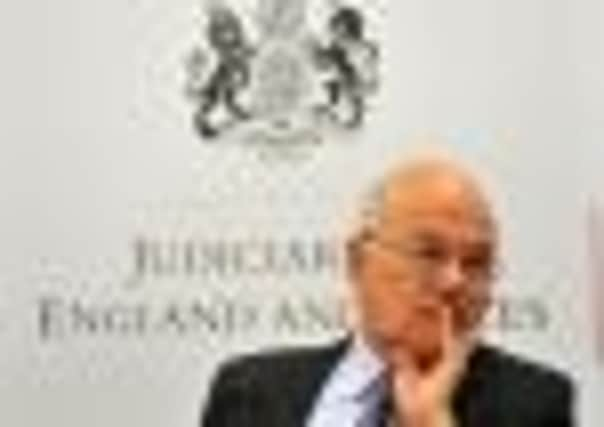Injunctions review ‘an attempt to gag coverage of Parliament’


Lord Chief Justice Lord Judge questioned whether it was a good idea for MPs and Lords to be “flouting a court order just because they disagree with a court order or for that matter because they disagree with the law of privacy which Parliament has created”.
Lord Neuberger, the Master of the Rolls and the most senior civil judge, also warned that reports of comments which intentionally contravene court orders may not be protected by Parliamentary privilege.
Advertisement
Hide AdAdvertisement
Hide AdSpeaking at the launch of a year-long review of injunctions by top judges and lawyers, Lord Neuberger said the law surrounding the issue was “astonishingly unclear”, which was “very unsatisfactory”.
It came after Liberal Democrat MP John Hemming recently highlighted two cases in Parliament.
He asked in the House of Commons about an order obtained by former Royal Bank of Scotland chief Sir Fred Goodwin, which banned news media from calling him a banker, and about another order which banned a constituent from talking to his MP.
A gagging order obtained by Sir Fred was partially lifted by the High Court on Thursday after allegations that he had an affair were made public in the House of Lords by Liberal Democrat peer Lord Stoneham of Droxford.
Advertisement
Hide AdAdvertisement
Hide AdMr Hemming said the review was an “attempt to gag the media in discussing the proceedings in Parliament” and was “a retrograde step”.
“What I find disappointing is that there does not seem to be any recognition by the committee that perhaps there is too much secrecy.”
Earlier, addressing the media at the Royal Courts of Justice in central London, Lord Judge said: “It is, of course, wonderful for you if a Member of Parliament stands up in Parliament and says something which in effect means an order of the court on anonymity is breached.
“But you do need to think, do you not, whether it’s a very good idea for our law makers to be flouting a court order just because they disagree with a court order or for that matter because they disagree with the law of privacy which Parliament has created. It’s a very serious issue in my view.
Advertisement
Hide AdAdvertisement
Hide Ad“There has never been any question, in any of these orders, not in any single one of them, of the court challenging the sovereignty of parliament.
“That’s not the issue. We are following the law, as best we understand it, at the level of the judiciary where the issues have been canvassed.”
He added that senior judges would be holding talks with the speakers of the Commons and the Lords over the issue.
While no right to privacy existed before 2000, the implications of the Human Rights Act 1998 and the European Convention on Human Rights were “indeed clearly explained to Parliament before the Human Rights Act was enacted”, he said.
Advertisement
Hide AdAdvertisement
Hide Ad“Contrary to some commentary, unelected judges in this country did not create privacy rights.
“They were created by Parliament. Now that they have been created, judges in this country cannot ignore or dispense with them: they must apply the law relating to privacy matters as created by Parliament.”
Under new rules for judges, any members of the media who would be subject of an injunction would be told beforehand and would have the chance to contest applications before they were granted.
But Lord Judge admitted that bloggers and users of social network sites such as Twitter would not necessarily be covered.